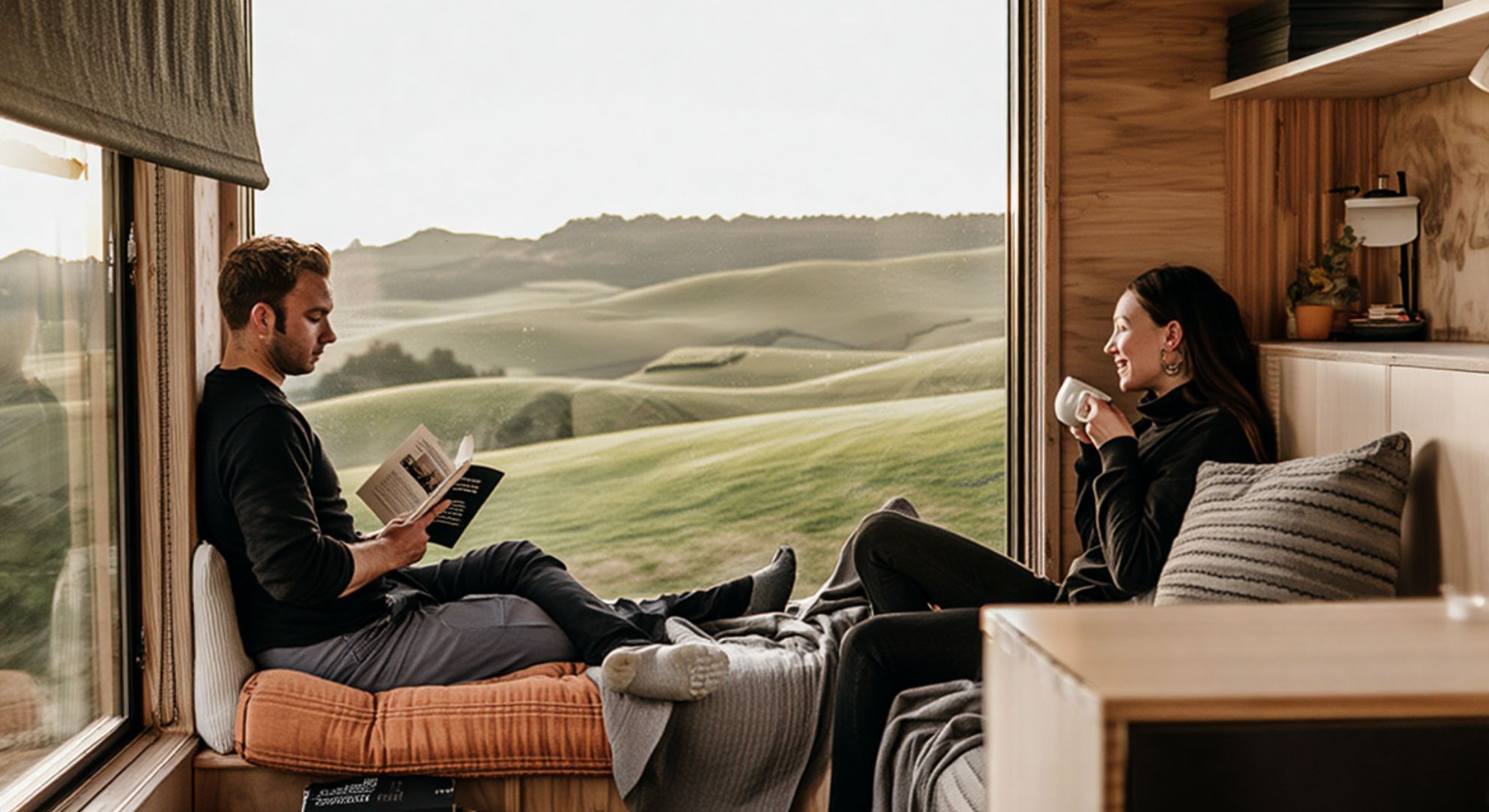They drove past the last traffic light, turned onto a gravel road, and felt their shoulders drop. Night arrived without neon, and the stars looked near, almost handmade. In that gentle dark, Zoe and Liam said, “This is home,” and meant it with a kind of calm they never found in the city.
Why they left the city
Rent kept rising like a tide, and their time kept shrinking like a shoreline. Zoe counted hours lost to commutes, Liam counted weekends absorbed by errands, and both kept counting the months until they could finally breathe. “We wanted to trade rent for roots,” Zoe said, “and swap constant noise for actual quiet.”
In Auckland, life felt efficient yet edgeless, productive yet thin. They craved a life that was tactile and intimate, where the seasons left fingerprints on their days. “I missed the sound of wind against trees,” Liam said, “and the way mud tells you it’s been raining.”
Designing a small life
Their tiny house is 24 square meters, set on a gentle hill, framed by kanuka and gorse kept at bay. A loft bed keeps sleep aloft, while a fold-down table keeps dinner nimble. Sunlight comes through a skylight, and the deck turns coffee into an occasion.
Power is mostly solar, backed by a small battery and a modest gas bottle for cooking on rainy weeks. Rainwater tanks feed a compact kitchen, and a composting toilet turns worry into fertility. “Our home asks for participation,” Zoe said, “and pays us back with presence.”
They learned to live by weather, by when the wind is kind, by how the light slides across their desk. “Silence here has texture,” Liam said, “and even chores feel involved.”
Counting costs and gains
They made a spreadsheet with two columns—what they give, what they get—because decisions this big need clarity. Here are their personal figures, shared to keep the story honest.
| Aspect | Auckland apartment | Tiny house countryside |
|---|---|---|
| Monthly housing cost | NZ$2,600 rent | NZ$480 land lease |
| Space | 70 m² | 24 m² |
| Commute | ~70 min/day | ~10 min to town |
| Utilities | NZ$220 power/water | ~NZ$40 gas + solar |
| Noise level | Sirens, neighbors | Wind, birds |
| Maintenance | Landlord | DIY, simple |
| Community | Anonymous | Tight‑knit |
| Footprint (approx.) | Higher energy use | Lower energy use |
They did lose a few luxuries, like endless storage and last‑minute takeout. But they gained mornings that feel unhurried, and evenings that feel earned. “We used to buy time with money,” Zoe said, “now we buy money with time.”
- Their favorite “small” wins: a double‑duty bench that hides tools, a solar oven that bakes slow, a shared neighbor garden, and a ritual of watching evening clouds go pink
What surprised them
The first winter was bracing, the second winter was planned. They stacked wood early, checked seals on the windows, and learned to cure damp like a science. Space magnified small habits, which was sometimes humbling. “If you leave a coat on that chair,” Liam joked, “the chair becomes a permanent coat.”
Arguments change shape in a small home, but they also resolve faster. There’s nowhere to storm off to, so you trade volume for clarity. “We learned to say ‘I’m overwhelmed, not angry,’” Zoe said, “and let the emotion move.”
Surprise number three: community showed up quickly. A neighbor brought eggs with a weather report, another helped wire an outdoor light. “In the city, we shared walls, not lives,” Liam said, “out here, we share skills.”
Advice for would‑be downsizers
Start with how you want your days to feel, not just how your rooms will look. Let your calendar write your floor plan: if you paint, you need wall space; if you bake, you need counter flow. “Design for your habits, not your fantasies,” Zoe said, “and be honest about clutter.”
Test the life before you buy the trailer. Borrow a cabin for two weeks, live with two plates and two mugs, and see if the quiet feels rich or simply loud. Learn your local regulations, talk to the council, and ask neighbors what they actually notice.
Money still matters, but time is the real dividend. Liam works three days at a local workshop, Zoe freelances with flexible hours, and both keep a garden that grows more than just food. “I don’t miss the city,” Zoe said, “I miss the version of myself I never had time to meet.”
On clear nights, they step outside with mugs that steam like small signals, and the paddock hums with cricket wires. They can trace constellations with a fingertip of warmth, and find their house by the tiny gold window that says, quietly and completely, we are here.
